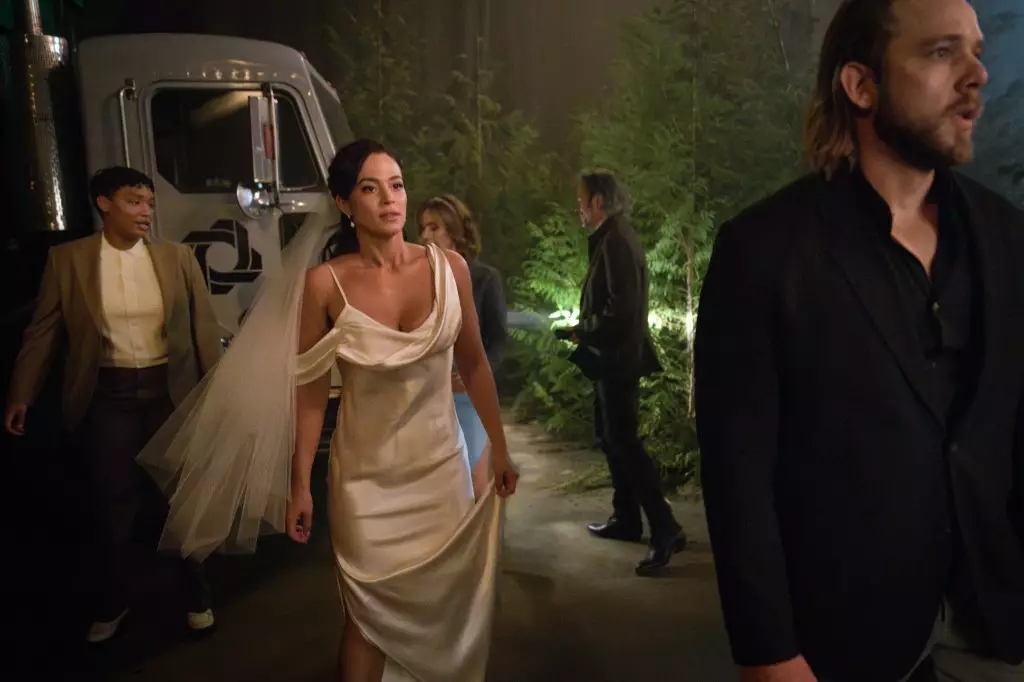The highly anticipated season 3 premiere of *Fire Country*, titled “What the Bride Said,” launched into a whirlwind of surprising chaos that transformed a seemingly joyous occasion into an emergency response scenario. Instead of the expected wedding drama, viewers were treated to a calamity that shook the characters and the audience alike—a helicopter crashing through the stained glass of the church where Diego and Gabriela’s nuptials were meant to take place. This incident not only encapsulates the spirit of the show, which often blends personal and professional lives of firefighters, but also sets a tone for the season that promises intrigue, challenges, and emotional confrontations.
Showrunner Tia Napolitano shared insights into how they aimed to shatter typical wedding moments by integrating shocking elements that retain viewer interest. Her team’s brainstorming session led to the audacious idea of a helicopter crash, a decision that was pivotal in differentiating *Fire Country’s* approach from more traditional narratives. The notion that the wedding would be disrupted was not just a plot twist; it served as a way to explore new character dynamics in the midst of chaos. This willingness to take risks illustrates Napolitano’s understanding of the audience’s expectations while simultaneously delivering the unexpected.
Despite potential disbelief from the audience regarding Gabriela’s heroics while clad in a wedding dress, Nabolitano emphasized that the character’s actions exemplified the instinctive rush to assist despite dire circumstances, demonstrating genuine valor that transcends the impracticality of attire. This capture of human instinct amid calamity offers a glimpse into character resilience that is paramount for the show’s narrative.
One of the season’s deeper explorations is the relationship dynamics within the Leone family, particularly concerning Manny’s protective instincts towards his daughter Gabriela and her relationship with Bode. Napolitano identifies Manny’s apprehensions as stemming from a protective love, rooted in his own experiences with failed relationships. The fear that Bode and Gabriela might echo his past has created palpable tension, pushing familial boundaries and complicating their interactions. This nuanced portrayal of family and love hints at a more significant theme of generational trauma and the struggle of individuals to break free from the shadows of their predecessors.
Napolitano’s insight into Manny’s character adds layers to the patriarch’s responsibilities, acknowledging that parental love does not always equate to understanding or acceptance. It highlights the ongoing navigation of loyalty and ambition that each character must embark upon—a sentiment that resonates deeply with viewers.
The decision to split the first episode into two parts is a creative strategy aimed at preserving the audience’s engagement with the visually stunning backdrop of the narrative. By extending the story, the showrunners are exploiting the carefully built sets and high-stakes action to delve deeper into character arcs. This choice not only enables viewers to absorb the unfolding drama but also allows writers to flesh out subplots that offer rich storytelling opportunities. The picturesque imagery of the forest and helicopter is symbolic of the dichotomy between beauty and chaos—the very essence of *Fire Country*.
The promise of continuity is bolstered by the cliffhangers that often define episodic storytelling, ensuring that viewers remain emotionally invested in the outcome of each character’s plight. This method of storytelling has established a dynamic flow and rhythm, drawing audiences deeper into the personal challenges faced by the characters amid their careers as firefighters.
As the characters evolve, themes of legacy become central to the narrative, especially through the lens of Bode’s journey towards embracing his identity as both a firefighter and a member of the Leone family. Addressing the complexities of familial legacies, the show endeavors to explore how past traumas shape present relationships—something that elongates the visceral experience for the audience. Napolitano hints at revelations regarding not only Bode’s family but also other characters, promising depth, expansions, and the introduction of new faces within the community.
Additionally, the involvement of guest stars such as Jared Padalecki promises fresh perspectives on established characters, while potentially setting the stage for spinoff opportunities. This infusion of new talent speaks to the show’s commitment to evolution and engagement, recognizing the significance of both character development and narrative expansion.
The season 3 premiere of *Fire Country* sets an ambitious tone with its unique blend of personal turmoil and adventurous chaos. By challenging conventional storytelling methods, it invites viewers to engage with nuanced characters entrenched in complex emotional landscapes. Napolitano’s leadership and vision promise a thrilling season ahead, and the anticipation surrounding each episode fosters a dedicated viewership. As the narrative unfolds, audience members are left to ponder not only the fate of characters but also the deeper significance of choosing bravery in the face of adversity.

